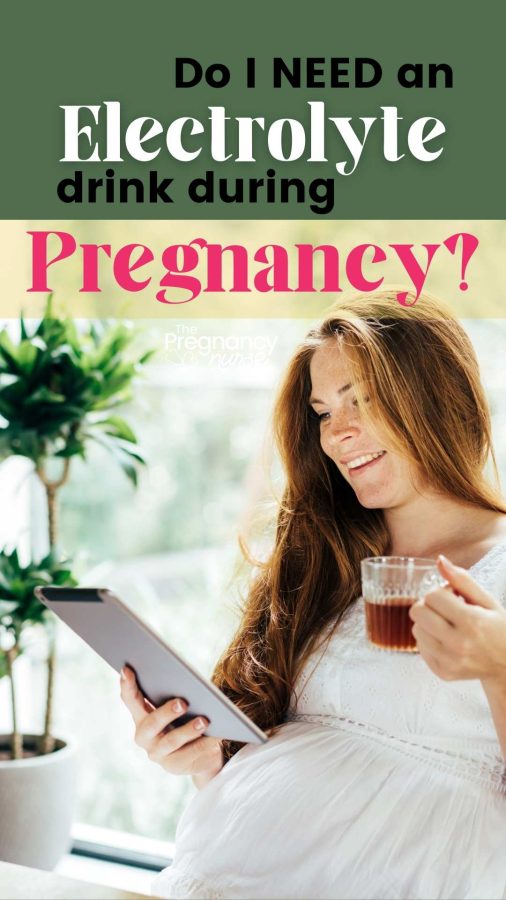👋 I’m so glad YOU are here. Are you looking to also get your partner prepared? This is for BOTH of you. Couples just love it and I know you want to both feel prepared!
For pregnant women, it is essential to pay extra attention to their fluid and electrolyte intake. During pregnancy, the amount of blood in a woman’s body increases by up to 50%. This increase in blood volume puts strain on the heart and can lead to dehydration. Dehydration can cause numerous problems, such as premature labor, low birth weight, and even fetal death. However, do pregnant women NEED electrolyte drinks? Let’s explore this topic further.

Before we get going, I was pretty shocked by how almost all the articles on this topic are written by electrolyte replacement drinks for pregnancy — please do be mindful about who you’re taking information from.
First off….
What are Electrolytes?
An electrolyte is a substance that produces an electrically conductive solution when dissolved in water. Dehydration occurs when the body loses more fluids than it takes in, and can lead to serious health problems. Sodium, potassium, magnesium, and calcium are all electrolytes, and they are essential for maintaining fluid balance in the body. When you become dehydrated, your body loses electrolytes and your fluid balance is disrupted. This can be dangerous for pregnant women and young children. Electrolyte drinks can help replenish lost electrolytes and restore fluid balance, as well as supporting the nervous system.
Do Pregnant Women Need Electrolyte Replacement?
In general, no.
Healthy people — in general, do not need electrolyte drinks. If you’re eating (and absorbing) a varied diet that give you the vitamins and minerals you need will also be giving you the electrolytes you need. However, there are a few instances in which electrolyte monitoring is important:
- If you have severe nausea/vomiting and aren’t keeping fluids down. At that point, this may be an issue.
- If you’re doing extremely strenuous exercise that sweats a LOT (why they’re often called SPORTS drinks)
Please don’t get caught-up into the idea that you NEED electrolyte replacement because you are pregnant. If you’re experiencing a healthy pregnancy, water is your best plan to hydrate with.
Have you checked a birth class off your to do list✅? I have a few I recommend:
❤️ Best class for couples {per BabyList}
👩💻 Best class available on demand
⚡ Best class JUST for pain management
👶 Best Postpartum-Only Prep
❤️🧡💛💚💙💜 My favorite class is here.
Now is the time to get started!
Positives of Electrolyte Drinks During Pregnancy
The main positive attribute of these beverages is that they may make you drink more (often due to making “plain water” taste better).
Dehydration, unlike electrolytes, is a serious issue during pregnancy.
Issues with Dehydration During Pregnancy
Dehydration can happen more easily because the pregnant woman’s body is already working hard to support the growing baby and her own body’s needs.
Problems that dehydration can cause:
- Preterm Labor
- “false” labor (contractions that aren’t going anywhere)
- Uterine irritability (your uterus is just “irritable” — no real contractions, but feels crampy)
- Just feeling extra crappy — much more than you would in regular life.
Also, if you get sick (even just a light cold or flu), you need to drink a TON of water to help your body and baby feel alright through the illiness.
I have personal experience with this as I was SUPER dehydrated with a flu on my 2nd baby. I ended up getting 2 liters of fluid IV and felt like a whole new person when I left the hospital. It was AMAZING how much better I felt.
And, that was due to the fluids, not electrolytes.
Negatives of Electrolyte Drinks in Pregnancy
The main one is that most of these sports drinks with electrolytes (like Gatorade or Powerade) tend to have a LOT of extra sugar and salt in them. Much more than you need. Other people are concerned artificial colorings or flavorings in the drinks as well.
If you have gestational diabetes, and possibly even high blood pressure and drink electrolyte drinks frequently it can be problematic. In fact, sometimes these two diseases can go un-noticed for a while, so in drinking these things in excess can cause extra issues with those once they are found.
Also, the cost can be hard on families. In looking at some of these electrolyte drinks I’m surprised by how expensive they are. In general, tap water is fine as long as your municipal water system is safe.
There is a trend in some places to drink distilled water, and that can be problematic as it would rid the water of minerals and possibly electrolytes. So, be mindful that whatever water source you’re using — make sure that it doesn’t take out the minerals out of it.
What types of issues can electrolyte imbalances cause?
Most often the one you see first is muscle cramps. This is because your muscles use sodium and potassium to make your muscles work. If you don’t have enough of those in your body you can get muscle cramps as your muscles “reset”.
Do You Need electrolytes if you’re getting pregnancy muscle cramps?
The dreaded Charlie horses in the middle of the night can be disturbing, and you’ll want to find a way to fix those.
However, these cramps are due to a variety of reasons:
- Swelling
- Increased blood flow for your whole body during pregnancy (so you’re body’s trying to figure out how to stabilize the electrolytes across your body with all this extra fluid)
- Increased weight
- Lack of exercise
The best ways to help these muscle cramps:
- Stay hydrated — drink lots of water (helps your body flush what it needs to the right places)
- Stretching
- Eat a well-balanced diet to make sure you’re getting the vitamins and minerals you need
- Take a prenatal vitamin (as this should have a good amount of potassium and sodium in it already)
They also recommend pregnant women talk with their provider before taking other supplements so that you’re not getting too much.
Many providers also recommend eating foods rich in potassium and calcium as well as they find that helps.
Can too many electrolytes be bad?
Not really. We take in a TON of electrolytes in our diet, and our kidneys filter out how much we need and send the rest out with our urine.
The main issue with the drinks is the increased sugar in them, and also that they have too much salt, which an be an issue if your blood pressure is sodium-sensitive.
Electrolytes while pregnant won’t hurt you — they just might not help. The added costs, and sugar can be problematic (especially if drank frequently).
Electrolyte drinks for pregnancy:
Heads up! 👀 There may be affiliate links in here – I might earn a smidge with your click. No cost to you, just good vibes! Check my boring stuff for deets.
There are a few on the market targeted specifically for pregnancy. Most of them come as electrolyte powders:
While Drip Drop isn’t targeted specifically for pregnancy, they definitely have a lot of information on how important electrolytes are during pregnancy on their website.
Might I also add that the fastest way to get hydrated is to drink two giant glasses of water. Not to reach for a “rehydration packet” — but I digress.
This one includes prenatal vitamins in your water — which would be good if you can’t keep down the pills.
And finally, Pink Stork is a popular one.
Again, if you’re looking for ways to make water more palatable this is a decent option to have once a day as they often flavor the water. But, absolutely not necessary unless your provider recommends it (or you’re unable to keep fluids down).
Best Electrolytes for Pregnancy
Honestly, whatever one you take in recommendation with your provider. Remember many electrolyte drinks have:
- More sodium than you need (which can be problematic for your blood pressure in some patients)
- More sugar than you need (again, not great to have added sugar — but it can make water more palatable — and I get that)
- Artificial colors or flavors that may be bad for you
So, talk with your provider before you start trying some!
How to stay hydrated with severe morning sickness:
Morning sickness can make it difficult to stay hydrated, but it’s important to drink plenty of fluids and replenish electrolytes lost through vomiting. Try sipping on clear or ice-cold fluids like water, clear broths, frozen water or ice pops, or sports drinks. Avoid caffeinated beverages like coffee, tea, and soda, which can make dehydration worse.
If you aren’t keeping fluids down at all you need to contact your provider, because dehydration, electrolytes and generalized nutrition are definitely an issue at that point.
Your provider should take this seriously. This isn’t to say that this a problem that can be solved for every pregnant woman, but they should be trying medications, IV therapy and possibly other things to try to manage this.
How much Fluid Intake Should You Have During Pregnancy?
Pregnancy is a time when it’s especially important to stay hydrated. How much fluid intake you need depends on a few factors, but generally, you should drink at least eight LARGE glasses of water per day. If you’re feeling thirsty, drink more.
Other fluids like fruit juice, milk, and herbal tea can count towards your daily total. However, most providers recommend getting more than half of your fluids from straight water. You can always add some fruit into an infusion water bottle, but most other drinks add calories and sometimes extra sugars you don’t need (looking at you juice). I also have a whole post about if you can drink wine during pregnancy.
Drink more if you’re exercising or it’s hot outside. dehydration can lead to preterm labor, so make sure you’re getting enough fluids.
A lot of people say to drink half of your body weight in ounces of water. So, if you’re 200 pounds, you’d drink 100 ounces of water/day. That’s a hard one for a lot of people to do. This may also be increased in your third trimester as you’re carrying more weight (and may sweat more).
A good measure of water intake that’s easy to tell is to check the color of your urine. It should have just a very small amount of yellow in it. If you find that your urine is a dark yellow, or heading towards an amber color you need to hydrate ASAP. You should do this throughout your pregnancy to make sure you’re getting enough water.
The good news with pregnancy is that you’re going to pee a lot, so you can check your hydration status frequently too!
I have whole post on what makes your water break that you might find interesting.
Can Pregnant Women Drink Gatorade?
Yes, most pregnant women can drink Gatorade.
It is important for pregnant women to hydrate, and Gatorade is a sports drink that can help them do that, and is most often safe to drink.
However, pregnant women should only drink Gatorade in moderation. And some women — like those with high blood pressure or diabetes — should NOT drink Gatorade. Those who are experiencing a lot of nausea/vomiting may find that these types of electrolyte drinks can help them keep their electrolytes in a safe area.
Gatorade should, in general, not be your main fluid source during pregnancy but having it now and then may make hydrating a bit easier. Be sure to talk with your provider if you have any questions.
What about postpartum & breastfeeding?
It’s similar then too — ask your provider if they think you need them. If you use them as a treat to get you to drink more, that might be worthwhile.
Water intake when you breastfeed is important to be able to produce the milk you need.
What should pregnant women drink during pregnancy?
Water should be their main source of hydration.
However, other types of fluids like, teas, lemonades, Gatorade, coconut water, or Ginger Ale may supplement the water. Many women “reward” themselves for having straight water a few times by having a glass of something more exciting.
What should pregnant women NOT drink during pregnancy?
It is recommended that pregnant women limit their caffeine intake limit their caffeine consumption to less than 200 mg (about two, six-ounce cups) per day. Check with your favorite energy drinks or soda’s caffeine content before indulging in it as well. You can learn more about caffeine in pregnancy here. Remember that caffeine can actually increase dehydration due to it’s effects on the body. So, not a great source of hydration.
It is also recommended that there is NO safe amount of alcohol during pregnancy, as it can affect your fetus. Please talk with your doctor about non-alcoholic beers & wines before drinking those as well. Here is more info about alcohol and pregnancy.
Let me repeat that alcohol is not safe during pregnancy, and can also increase dehydration (as well as the issues with your developing baby).
So, that’s it on electrolyte drinks during pregnancy.
What IS safe to do, is to take a prenatal class. Come join me in The Online Prenatal Class for Couples. For just a few hours of your time, you can feel SO much more prepared for your hospital birth!
And, if you’re not quite sure you’re ready for that whole thing, check out my free prenatal class. It’s your first step toward getting in the driver’s seat of your birth.





 Is it OK to Eat Beef Jerky While Pregnant? The risks and benefits of dried meat
Is it OK to Eat Beef Jerky While Pregnant? The risks and benefits of dried meat
